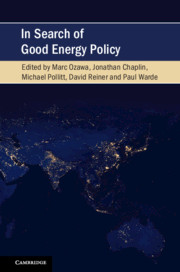Book contents
- In Search of Good Energy Policy
- In Search of Good Energy Policy
- Copyright page
- Contents
- Figures
- Tables
- Contributors
- Acknowledgments
- 1 Introduction
- Part I Multidisciplinary Perspectives
- Part II Cases and Multidisciplinary Responses
- 10 The Ethics of Nuclear Energy: Its Past, Present and Future1
- 11 Fukushima and German Energy Policy 2005–2015/2016
- 12 Rethinking the Environmental State: An Economic History of the Swedish Environmental Kuznets Curve for Carbon
- 13 Fossil Fuel Systems to 100 Per Cent Renewable Energy-Based Smart Energy Systems: Lessons from the Case of Denmark, 1973–2017
- 14 The Politics of Carbon Capture and Storage: How Interests Have Outstripped Economics in Shaping the Evolution of a Technology
- 15 Scaling Clean Energy for Data Centres: Trends, Problems, Solutions
- 16 Public Participation in the Context of Energy Activities: The Role of the Aarhus Convention Compliance Committee
- 17 Biofuel Energy, Ancestral Time and the Destruction of Borneo: An Ethical Perspective
- 18 From Inspiration to Implementation: Laudato Si’, Public Theology and the Demands of Energy Policy
- Part III Multidisciplinary Cases
- Index
14 - The Politics of Carbon Capture and Storage: How Interests Have Outstripped Economics in Shaping the Evolution of a Technology
from Part II - Cases and Multidisciplinary Responses
Published online by Cambridge University Press: 10 June 2019
- In Search of Good Energy Policy
- In Search of Good Energy Policy
- Copyright page
- Contents
- Figures
- Tables
- Contributors
- Acknowledgments
- 1 Introduction
- Part I Multidisciplinary Perspectives
- Part II Cases and Multidisciplinary Responses
- 10 The Ethics of Nuclear Energy: Its Past, Present and Future1
- 11 Fukushima and German Energy Policy 2005–2015/2016
- 12 Rethinking the Environmental State: An Economic History of the Swedish Environmental Kuznets Curve for Carbon
- 13 Fossil Fuel Systems to 100 Per Cent Renewable Energy-Based Smart Energy Systems: Lessons from the Case of Denmark, 1973–2017
- 14 The Politics of Carbon Capture and Storage: How Interests Have Outstripped Economics in Shaping the Evolution of a Technology
- 15 Scaling Clean Energy for Data Centres: Trends, Problems, Solutions
- 16 Public Participation in the Context of Energy Activities: The Role of the Aarhus Convention Compliance Committee
- 17 Biofuel Energy, Ancestral Time and the Destruction of Borneo: An Ethical Perspective
- 18 From Inspiration to Implementation: Laudato Si’, Public Theology and the Demands of Energy Policy
- Part III Multidisciplinary Cases
- Index
Summary
It is not just economics and technology but stakeholder interests which have shaped the evolution of carbon capture and storage (CCS) technology as an option with a portfolio of low-carbon technologies. We trace how over the course of the 2000s, CCS went from largely unknown to being seen as a flexible, dispatchable technology applicable to coal, gas or biomass, which could address concerns over security of supply with minimal disruption to the existing power system and business models while addressing hard-to-abate sectors including heat and process industries. Four general themes are identified as explaining why the politics of CCS has been so difficult: (i) there is no pressure for politicians or other stakeholders to seek more efficient solutions; (ii) the lack of a coherent logic or overarching industrial policy narrative for supporting CCS, except perhaps in a few isolated locations; (iii) the nature of CCS requires a much larger initial investment and greater systems integration than other low-carbon options; and (iv) changing energy industry business models, which, over the past decade, had eroded some of the factors that had worked in favour of CCS.
Keywords
- Type
- Chapter
- Information
- In Search of Good Energy Policy , pp. 187 - 201Publisher: Cambridge University PressPrint publication year: 2019

